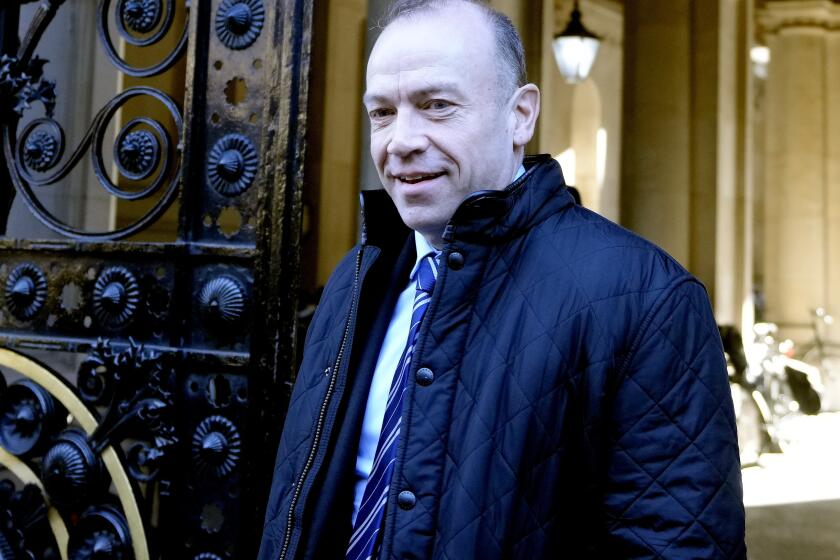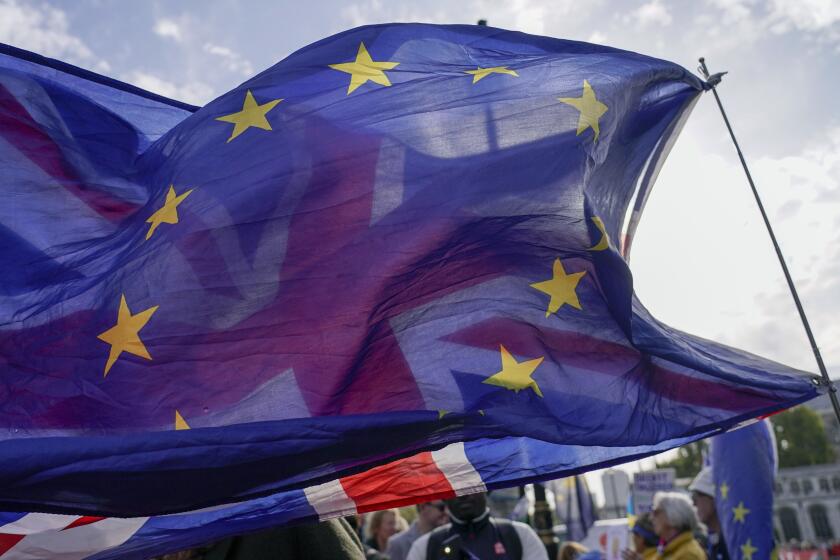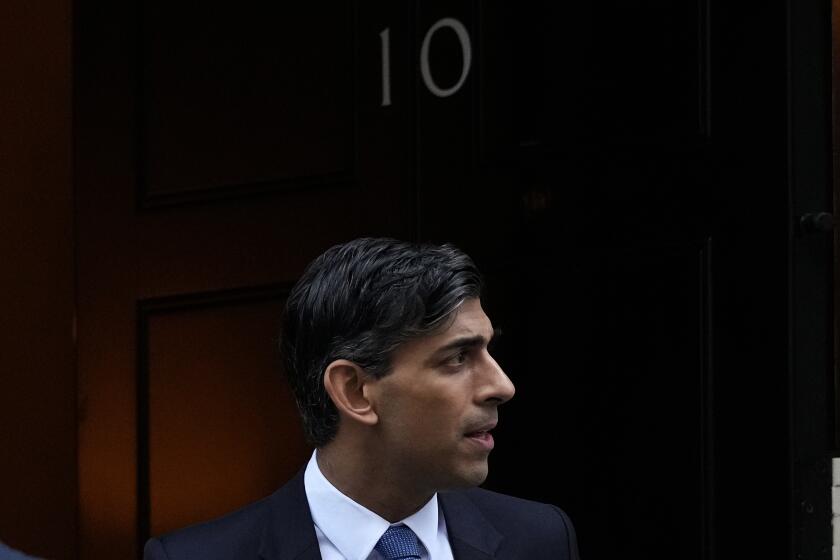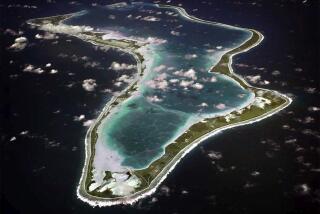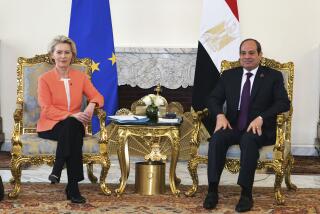Britain, EU announce deal to end long-running trade spat over Northern Ireland
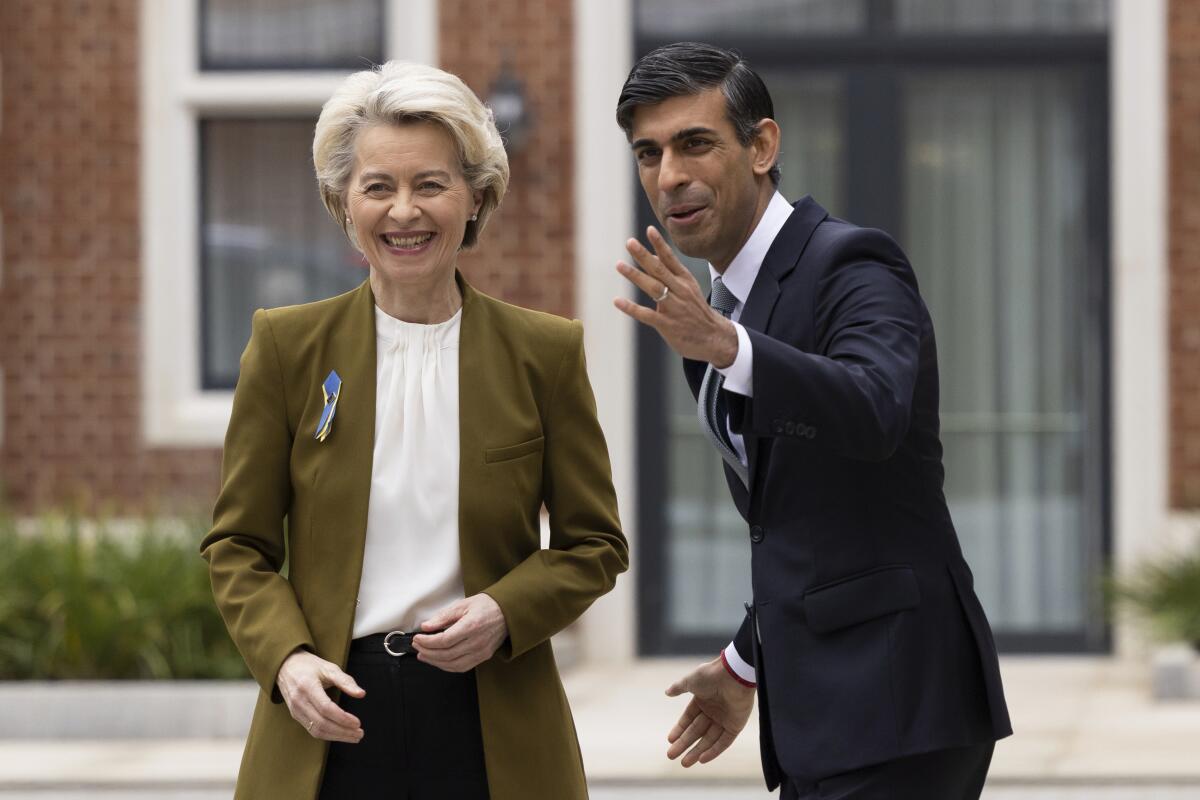
- Share via
LONDON — The U.K. and the European Union sealed a deal on Monday to resolve their thorny post-Brexit trade dispute over Northern Ireland, hailing the agreement as the start of a “new chapter” in their often fractious relationship.
British Prime Minister Rishi Sunak and European Commission President Ursula von der Leyen announced the grandly titled “Windsor Framework” after agreeing to the final details in Windsor, near London.
Von der Leyen said during a news conference that it was “historic what we have achieved today.” Sunak said there had been a “decisive breakthrough.”
The agreement, which will allow goods to flow freely to Northern Ireland from the rest of the U.K., ends a dispute that has soured relations between London and Brussels, sparked the collapse of the Northern Irish regional government and shaken the decades-old peace process in the province.
Fixing it ends a long-running irritant for Von der Leyen and is a big victory for Sunak — but not the end of his troubles. Selling the deal to his own Conservative Party and its allies in Northern Ireland may be a tougher struggle. Sunak awaits the judgment of Northern Ireland’s Democratic Unionist Party, which is boycotting the region’s power-sharing government until the trade arrangements are changed to its satisfaction.
Sunak is due to make a statement to the House of Commons later setting out details of the deal.
Senior U.K. and European Union officials are meeting as part of what Britain calls “intensive negotiations” to resolve a thorny post-Brexit trade dispute that has spawned a political crisis.
Northern Ireland is the only part of the U.K. that shares a border with an EU member state — namely, the Republic of Ireland. When Britain left the EU in 2020, the two sides agreed to keep the border between Northern Ireland and the Republic of Ireland free of customs posts and other checks, because an open border between them, allowing the free movement of goods and people, is a key pillar of Northern Ireland’s peace process.
Instead, there are checks on some goods entering Northern Ireland from the rest of the U.K. to make sure that they comply with EU rules and can therefore flow over the border into the Republic of Ireland. That angers Northern Irish politicians loyal to London, who say the new trade border in the Irish Sea undermines Northern Ireland’s place in the United Kingdom.
The Democratic Unionist Party, or DUP, collapsed Northern Ireland’s power-sharing government a year ago in protest and has refused to return until the rules are scrapped or substantially rewritten.
The British government is denying a report that it’s pursuing a relationship with the European Union that would remove many economic barriers erected by Brexit.
The party’s leader, Jeffrey Donaldson, said there had been “significant progress” but “key issues of concern” remained. He said the party would study the details before responding.
The devil, as ever, will be in those details, and the two sides emphasized different elements of the deal.
Sunak said the new rules “removed any sense of a border in the Irish Sea” by eliminating checks and paperwork for the vast majority of goods entering Northern Ireland. Only those destined to travel onward to EU member Ireland will be checked.
He said Northern Ireland’s lawmakers would be able to block any changes to EU goods laws that applied to them by using an emergency mechanism labeled the “Stormont Brake” after the home of the Northern Ireland Assembly.
“Today’s agreement delivers smooth-flowing trade within the whole United Kingdom, protects Northern Ireland’s place in our union and safeguards sovereignty for the people of Northern Ireland,” Sunak said.
Von der Leyen stressed that the EU’s borderless single market would be protected by safeguards including “IT access, labels and enforcement procedures” and said the European Court of Justice would remain “the sole and ultimate arbiter of EU law.”
The role of the European court in resolving any disputes that arise over the rules has been the thorniest issue in the talks. The U.K. and the EU agreed in their Brexit divorce deal to give the European court that authority. But the DUP and Conservative Party euroskeptics insist the court must have no jurisdiction in U.K. matters.
The British pound rose against the dollar after the deal was announced, and business groups welcomed the agreement. Tony Danker, who heads the Confederation of British Industry, said it would “allow businesses and politicians to turn their attention to economic growth and delivering greater prosperity.”
Sunak will have to face down his Conservative critics — including former Prime Minister Boris Johnson, who as leader at the time signed off on the trade rules that he now derides. Johnson was ousted by the Conservatives last year over ethics scandals, but is widely believed to hope for a comeback.
In a boost for Sunak’s chances of winning Conservative support, lawmaker Steve Baker — a self-styled “Brexit hard-man” who helped topple Prime Minister Theresa May by opposing her Brexit deal in 2019 — said he was “delighted” with the agreement.
British Prime Minister Rishi Sunak is pushing ahead with a contentious plan to remove all remaining European Union laws from Britain’s statute book by the end of the year.
Sunak said lawmakers in Parliament would get a vote on the deal “at the appropriate time,” but not right away.
Even if Sunak faces a rocky road at home, the deal likely marks a dramatic improvement in relations with the EU. They were severely tested during the long Brexit divorce and chilled still further amid disputes over the Northern Ireland Protocol.
Under Johnson, the U.K. government introduced a bill that would let it unilaterally rip up parts of the Brexit agreement, a move the EU called illegal. Sunak’s government said the bill would now be dropped.
Von der Leyen said the deal was “good news for scientists and researchers” because it would allow the U.K. to be readmitted to the bloc’s Horizon science program. The EU had been blocking that until the trade dispute was fixed, to the chagrin of British scientists.
News Alerts
Get breaking news, investigations, analysis and more signature journalism from the Los Angeles Times in your inbox.
You may occasionally receive promotional content from the Los Angeles Times.
After sealing the deal with Sunak, Von der Leyen had tea Monday with King Charles III at Windsor Castle. Buckingham Palace said the meeting was taking place on the government’s advice, leading critics to accuse Sunak of dragging the monarch, who is supposed to remain neutral, into a political debate.
Sunak’s spokesman, Max Blain, said the government “would never” embroil the king in politics.
“His majesty has met with a number of foreign leaders recently,” he said, including Polish President Andrzej Duda and Ukraine’s Volodymyr Zelensky. “This is no different.”
More to Read
Sign up for Essential California
The most important California stories and recommendations in your inbox every morning.
You may occasionally receive promotional content from the Los Angeles Times.
